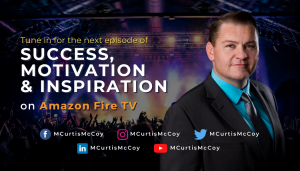Ladies and gentlemen, please put your hands together for Wendy Watson.
Thank you, everybody. All right, are you ready for a little bit of exercise? Okay, everybody stand up, please. Put your arms out, take a big, deep breath. Inhale, let your arms come up and around and push the energy as you exhale down through the ground. Awesome! Does that feel good? All right, go ahead and have a seat.
I know some of you are excited about my speech on my 70/20/10 rule and how to transform your communication from chaos to clarity. Before we do that, God wants to give me a little bit of a message to share. I have only had one exemplary male role model in my life, which was my maternal grandfather, and he passed away when I was 14. My dad eventually came around, but I have met the most amazing people in the last ten months, mostly through my contacts with Acheve. The people I’ve met, and the men that I’ve met – and there’s almost a dozen of them in here – are exemplary men who are changing the imprints in my mind on how I interact and see men. Yes, and so I want to thank you for that. I ask you guys to please continue to be the exemplary men that I met this weekend. Amen. And women, please know that you deserve these kinds of men and allow yourself to open up to them. Amen.
Yes, so communication seems to be a big thing this weekend, right? How do you quantify communication? So, I have it – it’s my spirit. I’ve always been a truth speaker; I cannot be anything else. Even when I think about it – oh, maybe I should – no, I can’t. It’s not true to myself; I just can’t do it. Even when I was two years old, I played with my sister and cousins at my uncle’s house, and I came out to get some water. All the adults love razzing each other, right? Love giving each other a hard time, but when you’re two years old, you don’t know that. So, I hear my uncle, my dad’s brother, giving my mom a hard time, and I walk up to him and tell him, “You’re not allowed to speak to my mother that way.” And he’s like, “Excuse me? Who are you, little Miss 2-year-old?” And he looks at my dad, and my dad’s like, “What do you want me to do? She’s defending her mother; I’m not going to tell her not to.” Right? That is just me; that’s the way I’ve always been.
When my parents divorced when I was eight, as a Cancer and an empath, it broke me. It traumatized me; they broke up my family, this safe home that was supposed to teach me all about this world, and it made me angry. What do you think that did to my communication? Made it angry. I didn’t treat people very well.
On top of that, my mother felt so bad for the divorce she would spoil us. I would go if she invited us to run errands with her. I would go only because I knew that there would be a department store, and I knew that there would be shopping, and I knew I would get something. Even into my first marriage, I continued that habit. I couldn’t go shopping for him, whether socks, underwear, jeans, or whatever, without buying something for myself. So, let’s add in some selfish communication along with that angry communication. Do you think that boded well for healthy relationships? Not at all.
My dad was a contractor; we would go work with him on spring breaks and on the weekends. So, I’m the boss’s daughter, 16, telling grown men what to do and how to do it. Do you think they liked that? But it taught me how to be assertive. That didn’t do well when I went to the office, working with a bunch of women. I cannot tell you how many jobs I got fired from for being abrasive. But at the same time, they wouldn’t tell me what that meant. They wouldn’t give me examples; they wouldn’t train me; they would just – in California, they would just let you go because there’s another 100 to 200 applications waiting to take your job, right? So, my mom always says that they never knew what was going to come out of my mouth. When I got upset, I would go to my room, deal with my emotions, come out, walk right up to the person that I wanted to speak to, regardless of what they were doing, regardless of who was in the room, tell them what I needed to say, turn around, and walk away, not even giving them a chance to respond or rebuttal – anything.
As I was writing this book, I was talking with my family through it, and she said, “You would leave so many people in tears,” I turned around and walked away because I was angry and selfish. Advance a couple of decades: I’m now living in Phoenix. I’ve got my second job. Can you imagine being raised by entrepreneurs, being a woman, having perfectionism? I was an absolute perfectionist with angry, selfish communication in the corporate world, in accounting. My… I didn’t do well with building relationships, especially at work, because I didn’t take no for an answer. In construction, there’s always a way around it. You have to think outside the box to give the clients what they need, what they ordered, what they ask for. You have to get creative; there is no no. Well, Corporate America doesn’t like that, right?
So, my manager comes up to me one day, and my audit manager sits down, and he’s like, “Look, we have a 70/20/10 rule. As long as 70% of the invoices go through without incident, 20% gets escalated to management, and 10%, we write off. That is our goal.” I was like, “Wait a minute; you’re willing to write stuff off? Like, that’s a new concept for me. Like, holy moly.” And he was like, “Yeah, actually, we make a plan for it.” I was like, “What a concept.” And then it was, “Wait, I don’t have to be perfect, right?” And then it was like, “I don’t have to be perfect.” He permitted me to not be perfect, and I took it, and I ran with it. And then I was thinking about that 70/20/10 rule, and I started looking at it through a lens of communication: What were people projecting at me? And I realized that 70% of the people, at the time, that were in my circle, 70% of what they projected at me was their own stuff – their own emotions, their beliefs, their own preconceptions, their judgments, all of that stuff. 20% might be a combination, but only 10% was directly personal to me or the conversation at hand.
Okay, I can do the math: If only 10 to 30% of what somebody’s saying to me is directly personal to me, why am I taking anything else personally? Why am I taking it in if it’s not meant for me and it’s their own stuff? Why am I taking it in? Why am I taking offense to it? Why am I taking it home? Why am I getting emotional over it, right? When we’re at work, and we’re working on these reports, or we’re working on our speeches, and then somebody chimes in, and they give their own perspective, right? That’s our baby; we get protective over it. So if somebody doesn’t like it, why are we taking it in, right?
So, finding the value in the conversation that you’re having: Is 70% of the value of the conversation you’re having the most valuable? ‘Cause that’s quite the conversation that you’re having; it’s only 10% of it valuable, right? I’ll tell you a little story: My sister and I were on vacation with my family and her three kids. It’s summertime; we’re on the Colorado River, river running on the pontoon boat, tearing up the water on the jet skis. But when we’re not doing that, we’re sitting on the sandbar, watching the kids and the dogs play on the beach, just chatting it up and eating. At the time, my sister and I only talked once or twice a year, so we didn’t really know each other. And so, we’re talking about, you know, daily stuff, routines, what the kids like for dinner, all that kind of stuff, and she calls me spoiled.
I’m like, “Okay,” kind of took me back a little bit, and it ended the conversation. And I thought about it: Why would she say that? Well, first of all, she’s the older sister. Who here thinks their younger sisters or the baby of the family is spoiled, right? Yes, they always get away with a little bit more than the older ones, right? There’s that imprint. Right, she is also a teacher with a family of five. Her husband is the stay-at-home dad. They have a 2,800-square-foot house, and they are in California. Do you think they have a tight budget? I remember them having to portion out food when I went over there for dinner one night.
I went over there for dinner one night, so when I told her I eat steak and lobster twice a month, do you think that sounded extravagant to her? Absolutely. So, I get it; I get her perspective. I don’t think I’m spoiled. I run and operate my own businesses, multiple businesses. I manage myself, I manage my house, I manage my dogs, all my social life. I don’t have anybody to come take out the trash for me when I get home from work, and I’m too tired. I don’t have somebody to take me out to dinner, make me dinner when I’m too tired to cook. So, if after a couple of weeks, if I feel like I want a nice dinner, I feel like I’ve earned it. Absolutely.
So, there’s a difference of opinion, which is fabulous. The value comes in that we got to learn about each other, right? That 10% of the conversation was the most valuable to me because it allowed me to step into my empowerment, confidence, and leadership. Because I love how I make the decisions in my life, and I love how I run my life, right? So, that’s where the value comes in. I don’t believe in zero value; all information is good information, and every conversation has value to it, right? Right, 70% had the least value, but it was still valuable, but that 10% was the most valuable. And she never knew that we had this conversation until she read my book just a few months ago, and she’s like, “I have a ton of questions for you.”
Right, so where can you find the value in the conversations that you have with people? Not only that but once I figured that out, I then had to flip the switch. What am I projecting onto other people? What is the 70% that I’m projecting, that I’m saying onto other people in the conversations that I’m having with them, in the energy, in the emotions? Right, I was doing the same thing they were because I was all up here. So, the more I did my inner work and self-work, the more I learned about emotions and energy and all the spiritual oshy-gushy stuff, and the more I flipped that around. Most of the information that I give to people is valuable, and it is particular to that conversation at that moment, right?
So, what is it that you’re communicating? And are you being present for that conversation, or are you waiting to speak, waiting for your next turn to speak, or are you thinking about what you’re going to say next? Because if you’re doing that, you’re not actively listening to the conversation. Was this information useful for you? Absolutely. How are we on time? You got four minutes. Okay, all right.
So, if you haven’t booked an appointment with me yet and you still are interested, I would love it. I don’t even have my QR code; it’s back on my table over there, and so is my book because I didn’t think to bring it up because I was all in my intuition. So, um, if you’d like to buy – thank you, Kent, you’re amazing – um, if anybody would like to get a copy of my book, I have a bunch of them here. Thank you, darling. This is my book. I demonstrate the 70/20/10 rule in 16 different ways in my book, including business metrics. If you’d like to know how I apply it in client retention, employee retention, self-body image… Once you book an appointment with me, scan this QR code. If you hold that still for just a second, I sure can see the reflection right now toward me, and I’ll zoom in so people can see from VI as well. Cool.
Yay! Thank you very much. If anybody wants to learn more, you know where I’m at. Thank you, number one.








